.
Platz Uritzki, Saint Petersburg: Natan Altman, October 1918: a temporary work of post-Cubist architectural sculpture erected to
publicly commemorate the first anniversary of the October Revolution; by
the following anniversary, Altman’s canvasses “had already been cut up
and used for soldiers’ foot bindings” -- Susan M. Cerbesero: The Anniversaries of the October Revolution, 1918-1927 (2005): photographer unknown, From G: Journal for Elemental Form Creation 3, 1924 (Estate of Natan Altman/RAO, Moscow/VAGA, New York)
It lasted one moment, like the full blown lustre
of a peach or a rose, the next moment
that airy dream was over, now remain the unlit business
blocks, rats scurrying from trash bin to glassed-in bank
arcade, pavement carpeted with wet leaves, bodies sheltering
in the light rain dripping from the building overhang, the bones, the blows
that fall from all directions, from unlikely sources,
the scanning search beam of the police cruiser
cutting through the red mist, the quiet click of the picture of no one
being taken by an autoprogrammed camera somewhere
beneath the big clock on the bank
outside the BART station, the broken
clock that's never been correct, just as
the O/C guy who weirdly resembles Allen Ginsberg
confides in haste-elided rapidfire aside I'
as he rushes past on his nightly rounds, quick-pace
orchestra conductor of a speeded-up cartoon ghost symphony
waving his broken-off-wooden-chair-rung baton, furiously
banging on every newspaper box
in repetitive percussive impatient urgent enquiry
to see if the lost magic of revolution
might still be lingering
in a broken coin slot

Crowd in front of Sproul Hall in rain during Free Speech Movement rally: photo by Ron Hecker, December 1964 (UC Berkeley, University Archives

Surrounding a University police car in Sproul Hall Plaza on 1 October, demonstrators listen to Mario Savio (standing on car roof) protest arrest of Jack Weinberg. Weinberg remained in the stranded car for 32 hours, until an agreement between President Kerr and protest leaders ended demonstration: photo by Don Kechely, 1 October 1964 (UC Berkeley, University Archives)

Memorial to the Free Speech Movement in Berkeley: image by Coro, 13 January 2009
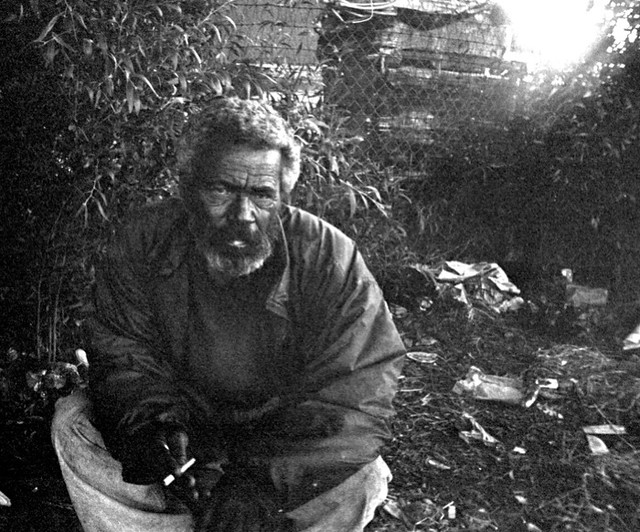
I ain't scared. Encampment behind Orchard Supply Hardware, along some railroad tracks, off Ashby in Berkeley: photo by efo, 13 July 2005
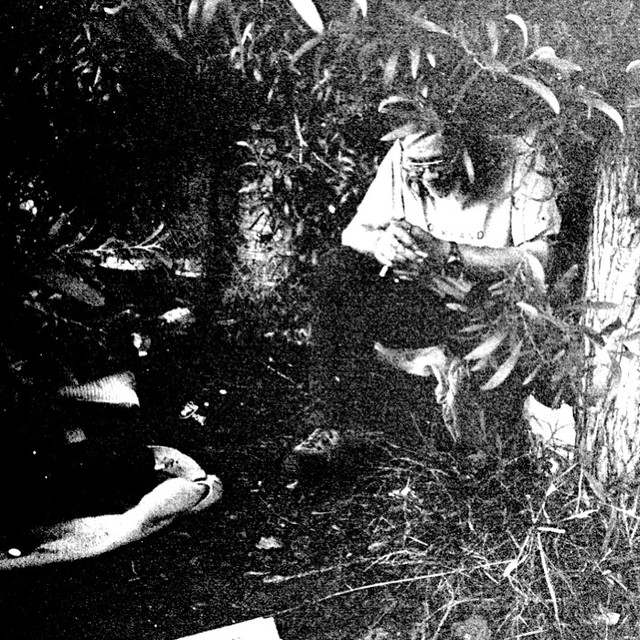
He's better lookin'. Berkeley, behind Orchard Supply: photo by efo, 21 July 2005
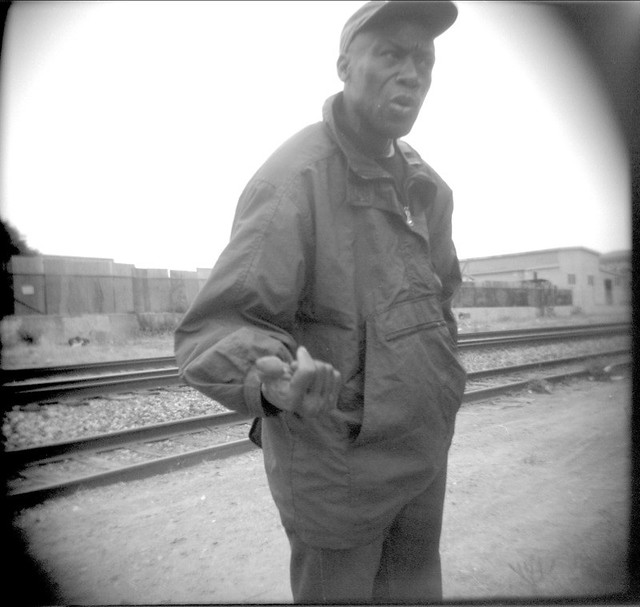
I saw a guy crying down here: Mike tells me about a Vietnamese guy, put out on the street by his daughter. Mike's great at relating stories: photo by efo, 22 August 2005
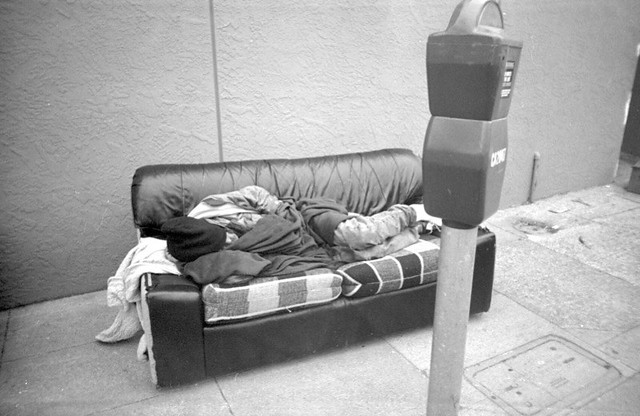
Luxury. Asleep at the corner of University and California, Berkeley: photo by efo, 31 July 2005
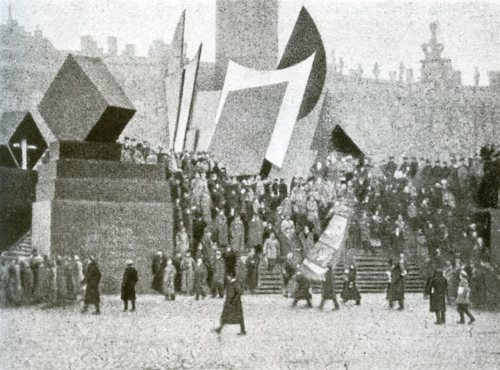



15 comments:
Was that one moment always going to be something past?
The poem hurts to read and it's beautiful.
Love that poem, Tom.
--Aram
Tom,
"It lasted one moment. . ." [says it all].
Great photos of Berkeley in the sixties, a few years before my time there (but we heard about it in high school, across the bay, didn't yet know what it might mean) followed by those of efo -- what a coupling.
11.13
light coming into sky above black plane
of ridge, silver of planet below branch
in foreground, wave sounding in channel
remains the same, dimension
of time other than it
that when the sound of each,
which happened, first
silver of low sun reflected in channel,
shadowed green pine on tip of sandspit
I love the quiet click of the picture of no one . . .
Wow, that is the essence.
And that airy dream
I still dream . . .
and sometimes the street people seem to mock it all.
I am thinking suddenly of that yo-yo man in Berkeley,
all day with his yoyo ing . . .
Thank you for the poem, the post, yet again.
To the memory of Mario Savio.
But what a moment! Doomed, yes, because The System Machine, which the FSM addressed, is a dead thing that kills everything sooner or later, as we are seeing. The System Machine proudly turns the world to carrion and feeds on the carrion that it produces. Death sustains it. Every day there are fewer human attributes and qualities to The System Machine. As Ouspensky said, dead people rule the world.
But for a time, for a moment, for a decade or more, starting in Berkeley in 1964, an alternate current coursed around the planet. “That airy dream” grew into a vision of another way to be in the world; it opened a few minds (just not enough minds) to other possibilities. Maybe that’s all we should expect this late in the game. A civilization going downhill for ten thousand years builds up a certain momentum, carries everything before it, and stops only when it hits bottom. There is a growing awareness that the bottom is rising up to meet us. We have no more control over this than a man who has tripped and fallen headlong down the stairs can control his descent.
The way this builds toward and crashes into the final lines -- "banging on every newspaper box /
in repetitive percussive impatient urgent enquiry / to see if the lost magic of revolution / might still be lingering / in a broken coin slot" -- quite frankly is a wonder of the verses' furious lament. I like this very much.
Many thanks, friends.
The bottom has indeed risen up to meet us, and we are it. And even more alarming, turns out, on closer inspection, it is us.
But still, as Nin reminds -- ah, that airy dream! And Hazen -- But what a moment!
The sensory data incorporated in this post passed across the dulled neural threshold between 2 and 4 AM, 11/12/12. While the true-life events here reported were transpiring, the tiny walkman with the one earbud that survived the springtime auto mayhem was bringing in a talk by one's long ago college classmate Tom Hayden, regarding the survival of the spirit of the Free Speech Movement. Which went on just up the street from the presently indicated location.
One's own memory functions now impaired, one relies at critical moments (when faked recollections simply won't do the trick) on the still keen mnemonic powers of the Dame of the Manor.
She says the FSM did indeed really happen, she was there, this (the period documentary photo-capture) was how it was, sort of.
For lack of a better understanding, one imagines the movement to have been a complicated workaround for getting up the nerve to ask her for a date. At least that would have made sense.
Aram will have remembered the atmosphere of the epoch.
Stephen in his poem fortuitously evokes it all without perhaps intending to. All has changed yet something
remains the same, dimension
of time other than it
that when the sound of each,
which happened, first...
Chicken or the egg? Repressive old order, revolting young? Time immemorial or blurred memorial of the upside-the-head blows of yesteryear?
Proximate instigation came from recent conversations with WB regarding certain of his recent posts, leading back toward some of the matters broached herein.
And the rest may or may not be be history.
The “Polytechnic” movement lasted long enough to help bring down a hated junta some 40 years ago and then its star performers sooner or later became politicians and/or government officials who become part of the establishment that became responsible for eventually bringing Greece to its current dire financial and spiritual state—sound familiar?
Btw, a really fine poem.
Vassilis reminds there is a curious repeating system to these power structure upheavals. Déja vu all over again. Depressing yet true, too true. Would 'twere otherwise, but then again...
Turn turn, turn. For all oppressive forms of social control there ought to be a complementary turnabout in the fluid bag of tricks of the unfolding dialectic, a season for a peaceful seizing.
If only. One fears now the machinery has grown too large, too well hidden, to be seen, much less overthrown. Though even aboard the USS Love Pentagon the cracks are beginning to show, on the Down Low, beneath the waterline.
But maybe it's a No-Worries situation, yeah? Relax your mind, there is oversight, be certain you are now being watched.
Hazen,
Basic research...
Could this be what Ouspensky meant by Dead People Rule the World?
Tom: Great poem. I had hoped, along with many others, that the Occupy movement might be the harbinger of a new counterculture uprising, but it seems not to be.
Terry,
I had shared that hope.
But -- pfft, evaporation, or anyway air gone out of the balloon, alas.
Today's authoritarian capitalism will entitle you only to so much free speech.
For Mr. O, people without a conscience, even the rudiments of one, are psychologically, spiritually dead.
Pogo was a big influence in my adolescent years, and still is. Walt Kelley was a wise ole dude.
Beautiful poem today, and a terrific post.
Brad,
Certainly true, that.
The middle of the night in the downtown streets may be bleak, cold and at times a bit menacing, but there, and then, what speech one does encounter tends to move (for whatever this movement may be worth) more fluently outside that authoritarian control box.
Perhaps at times a bit too fluently. There are blades, there are dogs, instruments for enforcing (or forcing) a point.
Earlier on in the random night described in this poem, there had been a quarrel that escalated into a stabbing, there at that sidewalk encampment in front of the movie house. Second of such incidents in the past week. The cursing and snarling, a touch powder that can blow up in a moment.
Then of course arrive the night-cruising fleets of authority.
The participants in the 1960s FSM manifestations, as can be seen in the photos and videos I've posted, were largely UC students, with a smattering of local citizens of the same white liberal middle classes added in (as on that December day of many bumbershoots on the Sproul steps in the rain -- rain always a deterrent to the younger and more hardy, yet perhaps less well-equipped and also less patient, of the protestor "masses").
The unusual aspect of Occupy, as you'll have noted, was the presence of a few students, in among the ragged and the unwashed.
Then as now however, there were certain groups that seem to have stood off, regarding what was going on as an exercise in futility at best. In particular black people, who are in general, for obvious historical awareness reasons, so much harder to fool with talk about freedom.
Post a Comment